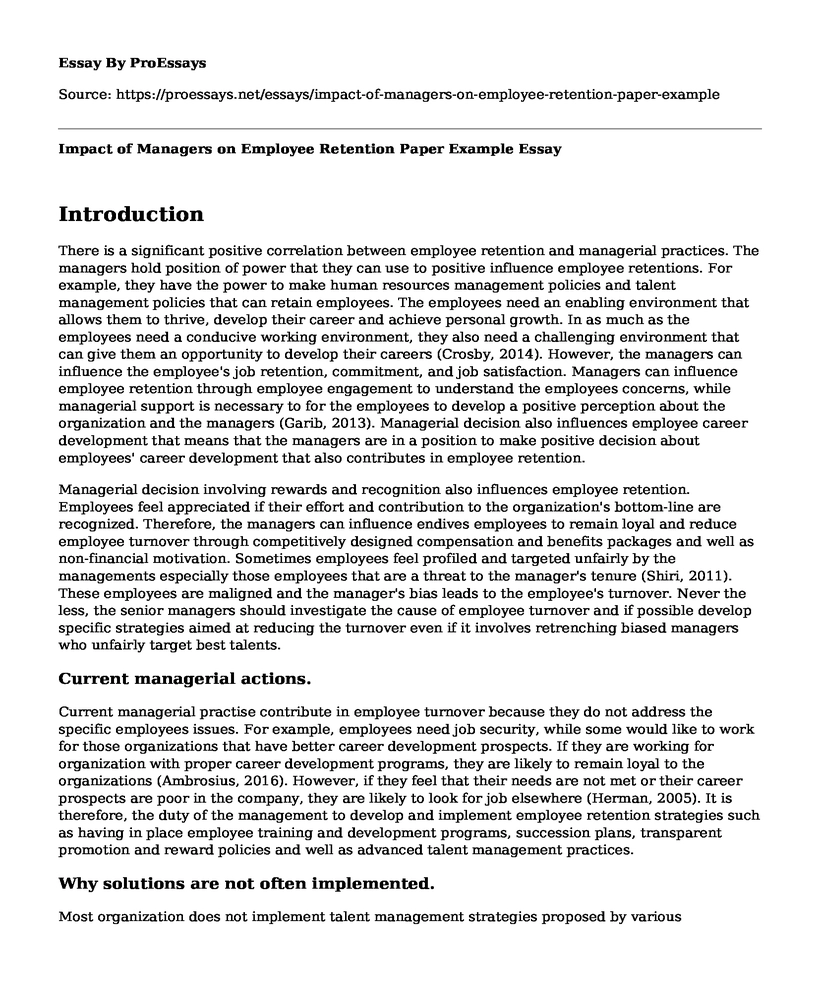Introduction
There is a significant positive correlation between employee retention and managerial practices. The managers hold position of power that they can use to positive influence employee retentions. For example, they have the power to make human resources management policies and talent management policies that can retain employees. The employees need an enabling environment that allows them to thrive, develop their career and achieve personal growth. In as much as the employees need a conducive working environment, they also need a challenging environment that can give them an opportunity to develop their careers (Crosby, 2014). However, the managers can influence the employee's job retention, commitment, and job satisfaction. Managers can influence employee retention through employee engagement to understand the employees concerns, while managerial support is necessary to for the employees to develop a positive perception about the organization and the managers (Garib, 2013). Managerial decision also influences employee career development that means that the managers are in a position to make positive decision about employees' career development that also contributes in employee retention.
Managerial decision involving rewards and recognition also influences employee retention. Employees feel appreciated if their effort and contribution to the organization's bottom-line are recognized. Therefore, the managers can influence endives employees to remain loyal and reduce employee turnover through competitively designed compensation and benefits packages and well as non-financial motivation. Sometimes employees feel profiled and targeted unfairly by the managements especially those employees that are a threat to the manager's tenure (Shiri, 2011). These employees are maligned and the manager's bias leads to the employee's turnover. Never the less, the senior managers should investigate the cause of employee turnover and if possible develop specific strategies aimed at reducing the turnover even if it involves retrenching biased managers who unfairly target best talents.
Current managerial actions.
Current managerial practise contribute in employee turnover because they do not address the specific employees issues. For example, employees need job security, while some would like to work for those organizations that have better career development prospects. If they are working for organization with proper career development programs, they are likely to remain loyal to the organizations (Ambrosius, 2016). However, if they feel that their needs are not met or their career prospects are poor in the company, they are likely to look for job elsewhere (Herman, 2005). It is therefore, the duty of the management to develop and implement employee retention strategies such as having in place employee training and development programs, succession plans, transparent promotion and reward policies and well as advanced talent management practices.
Why solutions are not often implemented.
Most organization does not implement talent management strategies proposed by various researchers because of many reasons. The most common reason being that career development plans, employee retention practices such as rewards and benefits are costly to the company (Ambrosius, 2016).
References
Ambrosius, J. (2016). Strategic Talent Management in Emerging Markets and Its Impact on Employee Retention: Evidence from Brazilian MNCs. Thunderbird International Business Review, 60(1), 53-68. doi: 10.1002/tie.21799
Crosby, D. (2014). Improving Employee Retention in the Public Sector by Increasing Employee Engagement. SSRN Electronic Journal. doi: 10.2139/ssrn.2555709
Garib, G. (2013). Leisure managers' perceptions of employee diversity and impact of employee diversity. International Journal Of Hospitality Management, 32, 254-260. doi: 10.1016/j.ijhm.2012.07.002
Herman, R. (2005). HR managers as employee-retention specialists. Employment Relations Today, 32(2), 1-7. doi: 10.1002/ert.20058
Shiri, S. (2011). Impact of Managers and Senior Leaders Influencing Employee Engagement. Indian Journal Of Applied Research, 3(8), 477-480. doi: 10.15373/2249555x/aug2013/151
Cite this page
Impact of Managers on Employee Retention Paper Example. (2022, Jul 08). Retrieved from https://proessays.net/essays/impact-of-managers-on-employee-retention-paper-example
If you are the original author of this essay and no longer wish to have it published on the ProEssays website, please click below to request its removal:
- Paper Example on Communicative Organizational Model
- Tools of Organizational Change and Changes at the Top Essay
- Ethics Auditing Essay Example
- Why Do Some Mergers and Acquisitions Fail? - Essay Sample
- Essay Example on Global Health Security: Reducing Risk for All
- Essay Example on Allison Elam's Idea: New MRP System or Costly Catastrophe?
- What a Good City Should Do - Free Paper Sample







